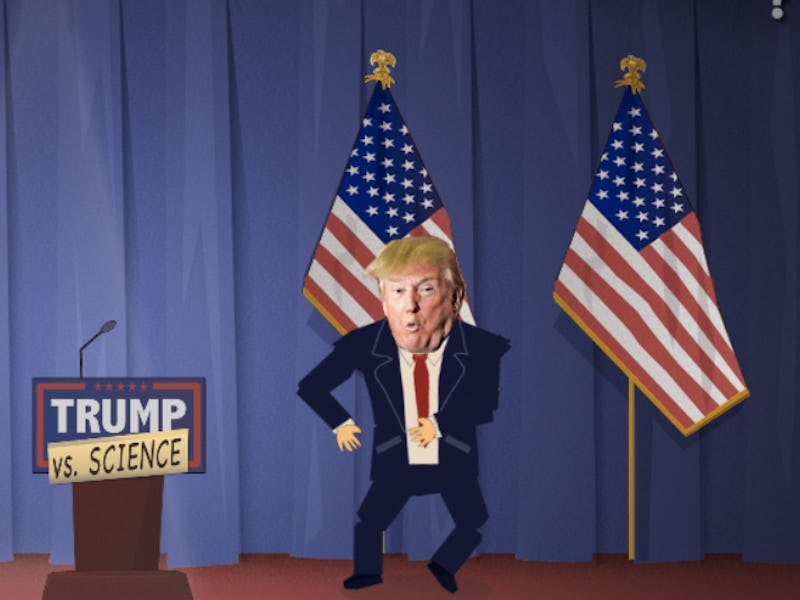The crazy-baseless claims Donald Trump has made about climate change have suggested a terrifying future for science policy in the United States, leaving the science-respecting community feeling very frustrated indeed. Sensing the need for these people to let off some steam, Finland’s Pyson Games has created an online game called “Trump vs. Science,” which allows irate science lovers to pelt planets at the president-elect as punishment for his adherence to a completely irrational ideology.
In the game, Trump lumbers side to side across a presidential stage, primate arms dangling as screenshots of his iconically science-averse tweets flash overhead. Users click furiously to deploy Earths and graphs at the tweet, which crash satisfyingly upon contact and leave a big red stamp with Trump’s signature accusation, “FALSE.” They also prompt an indignant sound bite from Trump: “Mark my words!” he says, followed by “Not good!” and, occasionally, “I think I am a nice person.” Throw enough intact planets at the tweet and it shatters. Score one for science!
Unfortunately, it’s not that easy for those fighting on the behalf of science to win in the real world: No amount of graphs, data, or planetary models appears to be enough to tear down the false claims of climate change deniers. And why should they? Fighting an irrational war with rational thought, frustratingly, has not proven to be a very good strategy.
But that’s all the more reason not to give up on it. The masterminds at Pyson Games are champions of science and see gaming as a way to open up STEM education to an even larger — and perhaps younger — community of people. “Our vision is to create a gaming experience that is fun, addictive and gives motivation to acquire real knowledge,” they write on their Kickstarter page. Their page also showcases a game called “ANTIDOTE,” in which players protect stem cells from viruses and bacteria by gaming the immune system through vaccination.
The parallel Pyson Games draws between anti-vaccination ideology and climate change denial is obvious, and they do not mince words in order to make it clear. They blame “sensationalist conspiracy theorists” for providing politicians with an easy route to appeal to voters. “[But] when the scientists are silently screaming ‘the world will change soon and your kids will die as a direct result of it’, we need people to know who to listen to,” the authors write.
The effort to bring truth into a post-truth world is small yet beautifully well intentioned, and in the seemingly losing battle against climate change deniers, every little bit helps. In a cheeky re-appropriation of Trump’s campaign slogan, they declare, “In the times of populism and false information, it’s time to Make Science Great again!”
